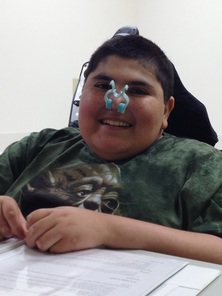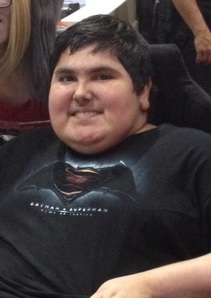
I am not trying to gross you out, or write about something that makes you uncomfortable. If this subject does, or causes you to shake your head in disapproval, then please stop reading. I am simply trying to share a little light on something those living with the monster understand all too well, and secretly wish others knew about their daily struggle. So, if you are open to reading about a natural, though challenging, part of life with Duchenne, please continue reading with an open mind and a sense of maturity.
When your son says “I gotta go number two,” or something similar, that is when Duchenne parents release a deep sigh, roll up their sleeves, and respond…
“Okay, let’s do this.”
We reply this way because, in reality, we have no choice, nor do our sons. We also say it because there’s no better way to address this subject than tackle it head on. We can’t wish it away. We can’t ignore it. We can’t help our son with half an effort. When he needs cleaned, he needs cleaned. There are no shortcuts involved. He needs our full attention, because when he has to go, he has to go, and he cannot do it without our help. Start to finish, it takes a while (sometimes up to an hour)…but, that’s just life with Duchenne.
Calls from nature involve teamwork, cooperation, and a lot of trust. We must work with our sons for success, mostly during the day though sometimes in the middle of the night. Our sons expect us to treat them with respect, dignity, and maturity. They don’t want us to make a big deal about it, as well we shouldn’t. Equally, we trust our sons to let us help them with a very private aspect of their life.
For us, it was a learning process that evolved consistent with Alex’s age. During the early years of our Duchenne journey, he used a toilet like anyone else. His weight was manageable and he climbed onto the toilet unassisted or with minimal help. Later, when he struggled to climb up or could not clean himself effectively because of weakening muscles and imbalance, we helped and life was good.
Things became interesting, however, when Alex starting using a wheelchair in the Third Grade. Because he could no longer walk, he could not exit his wheelchair and move to the throne. To help, we developed a piggyback transfer method, where I squatted in front of his chair, secured his arms over my shoulders, and then stood. After carrying him to the toilet, I turned around and carefully lowered him down. We used this transfer method everywhere…at home, friends’ homes, restaurants, hotels, and even school.
Although his school offered use of a smooth, wooden, transfer board to slide him from his chair to the toilet, Alex preferred the piggyback method. We were fortunate his elementary and middle schools allowed us to use spacious bathrooms in the teacher’s lounge or special needs classroom. Once parked in privacy, I would piggyback him from his wheelchair to a nearby bench or table, undress him, and then piggyback him from the table to the toilet. When he finished, we reversed the process. We had this method down to a science.
I helped Alex go to the bathroom nearly every lunchtime. While he did his business, we would chat about his school day, his friends, girls, or even do some last minute studying for an afternoon test. Looking back, we had some wonderful, father-son bonding conversations in the school bathroom just sitting, laughing, and talking. Fond memories, indeed.
As Alex grew older and his weight increased from immobility and steroid use, I could no longer safely transfer him by piggyback. For example, we laugh (thankfully) about a time at Pierce Point Cinemas, when Alex had to go number two during a movie. After my incredulous reaction of you’ve GOT to be kidding me…NOW?, we made our way into an accessible stall in the public restroom. Without a transfer table, we decided to piggyback and then remove his pants on the toilet (i.e., shift them back and forth until they come off). It was not ideal, as it led to slumping and uncomfortable repositioning. It was also not ideal that I piggyback a growing boy who, at the time, approached my body weight in size.
Not surprisingly, things did not go as planned.
After Alex backed his chair into the stall, I squatted to pull him onto my back. With his arms over my shoulders and his hands securely clasped in mine, I stood or at least tried to stand. Because of my failing ability, his increased weight, and gravity, I lost balance and we fell to the floor. With Alex's full weight on my back and my face on the clean checkered tile, we could clearly see beneath the stall door that nobody was around to help. We were alone, stuck, and unable to move. We laughed in hysterics.
I remember lying there thinking…Okay, it's up to us to figure this out (which, by the way, is a common theme with Duchenne).
As Alex hung on for dear life, we slowly inched our way back up and then eventually onto the toilet. Once in place, everything else went smoothly, normally, and naturally just as we planned. Although we missed most of the movie, THAT father-son moment will never be forgotten...by either of us.
When Alex developed back issues beginning in the Seventh Grade¸ we abandoned use of a toilet. His spinal compression fractures were painful and debilitating and he was bedridden for nearly five months.
When that first call from nature sounded, we didn’t know what to do. I couldn’t piggyback him to the toilet because of his pain or transport him via a Hoyer lift for the same reason. We had heard of fracture pans, but did not have one. I remember trying a baking pan instead, but that caused him severe discomfort. We considered towels, but were not sure of their capacity to contain everything. We settled on adult diapers and a quick run to the store while he patiently waited. Once secured, we then gently turned him on his side. With the help of some strategically placed pillows and towels, we were ready. The method worked wonders then, and still does today, five years later…and even the other night at 3AM.
Today, as a 17-year old high school Junior, if Alex has to go, I pick him up and take him home to conduct his business. I’ll then take him back to school if he is not too exhausted from sitting in his wheelchair or if it’s not too close to the end of the school day.
Though unpleasant, perhaps the biggest worry about number two and Duchenne is the dreaded indigestion. Nobody likes this. If our sons are sick or have an upset stomach, things get real interesting, real fast. In fact, our proficiency is tested and performed in fast-forward to make things work cleanly and efficiently. We just roll with the punches and work to keep things contained. It isn’t pretty. But, often life with Duchenne isn’t pretty.
I share all this because we have found that acceptance and creativity are essential with Duchenne, especially when our sons are older, heavier, and unable to move. Our sons learn to accept full exposure and we learn to treat it like it's no big deal. Because, it isn’t. It's life, and sometimes life with Duchenne needs a little exposure so others can understand the challenges involved.
The bottom line is that you may surprise yourself on how you address this natural act. Many use a hoist and transfer to the toilet. Some use a hoist and bucket, if the urge cannot wait. Any method takes time to undress your son, transfer and position him, and then let him do his business. It then takes more time to clean him, transfer him back to his bed, dress him, and then set him back up to whatever he was doing before he had to go. Like anything else, practice becomes routine with time, and soon you won’t even think twice about it. We have found that patience, maturity, and improvisation are the keys to a successful experience. A good supply of vinyl gloves and sturdy wet-wipes work wonders, too.
Whatever your method, just know that if it works…it works…and that’s all that matters. It doesn’t matter how you do it, just that you do it because it must be done. You may also discover, as we have, that it’s a trusting and bonding time with your son.
So, if you’re still reading this blog post, thank you. I sincerely didn’t intend to make you uncomfortable. Although some may consider the subject unpleasant or crossing the line of appropriateness, what can you do…
This IS life with Duchenne…
…and just one part of the daily grind.
Besides, everybody poops…remember?


 RSS Feed
RSS Feed